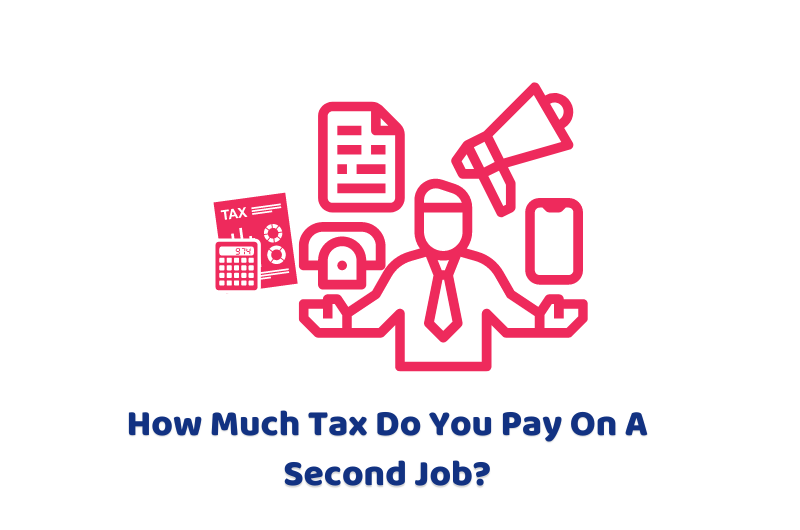Starting a second job will change your tax bracket and the tax code. Ultimately, making your tax records a little bit confusing to calculate in the UK. This is the reason why many people ask about the second job tax rate before they start a contract with the second employer.
Not only the tax rates but the National Insurance Contributions (NICs) and pensions are also affected by the second job. Many people are rushing towards a second job to make an additional passive income due to the rising inflation. But they must be aware of the tax consequences of this second-job decision to avoid any hassle later when paying their taxes to the HMRC.
In this article, we will walk you through the second job in the UK and what tax rates are applicable in this particular case. Moreover, we will discuss personal allowances, National Insurance Contributions (NICs), pensions and tax codes. So, let’s dive in!
Taxes become complex when you are getting income from multiple sources at times. Worry not! Seek help from qualified tax advisors at the AccountingFirms. Contact us now.
Second Job Requirements in the UK
A second job in the UK will make you earn more money, uplifting your lifestyle. However, there are some rules and regulations you need to know before you start another job. These rules will help you take the right decision and avoid conflict eventually. For example, the contract from your first job allows you to start a second job while working with the first employer. The reason behind this is the avoidance of any clash of interest between your first and second employer and possibly the working term and conditions may be violated due to the second job.
If your age is above 18, you can work as many hours as 48 hours in a week. So, if your working hours are less than these hours, you can earn more by working for more hours. On the other hand, the UK rules that an employee’s minimum wage must be £8.91 per hour. If it makes your financial position weaker as you are not getting enough, you can take the decision of starting your second job.
Second Job Tax Rates
HMRC provides you with the convenience of calculating your taxes from all your earning sources as they take into account only your gross income. Instead of calculating tax separately from each of your income sources, they calculate the tax on your whole salary. The tax rates are as follows:
- You will pay 0% of the tax on your income from £0 – £12,570
- You will pay a tax of Basic Rate (20%) on your income from £12,571 – £50,270
- You will pay a Higher rate (40%) on your income from £50,271 – £150,000
- You will pay an Additional rate (45%) on your income beyond £150,000
The 0% or tax-free income is also known as the personal allowance. If your total earnings from the two jobs are more than the personal allowance, HMRC will consider your first job as the main job, providing the personal allowance on the first job only. However, your second job will be taxed at the basic rate.
If the income from both sources is less than the personal allowance, you will request the HMRC to split the personal allowance. For this, you will need to receive form P60 from your employer at the end of the financial year.
Self-Employed Persons and Second Job Tax Codes
As a self-employed person, you will be required to get registered for the self-assessment tax returns. On the other hand, you will also get personal and trading allowances of £1,000 each. If you are an employee in your first job and self-employed in your second job, you will calculate the tax after calculating the gross salary. You will deduct the personal and trading allowance and then pay the tax according to the tax bracket in which your income falls.
National Insurance Contributions (NICs) and Second Job
After starting your second job, you will pay NICs on both of your incomes. If you are an employee, you will pay Class 1 National Insurance Contributions. As a self-employed person, you will pay Class 2 or Class 4 NICs. The amount of National Insurance Contributions will be determined by the HMRC and they will inform you about how much you will pay after you start your second job.
State Pension and Second Job Tax Rate
National Insurance Contributions are not deducted once you reach your state pension age. However, if you’re a self-employed person, you will pay the National Insurance Contribution of Class 4 until you reach the state pension age.
In other words, if you have started your job after you have reached the state pension age, your employer will not deduct National Insurance Contributions from your wage anymore.
The Bottom Line
Finally, we conclude that a second job will change the tax code if your earnings from the second job is less or more than the income from the first job. As a result, you will be paying more tax to the HMRC due to the BR tax code applicable to the second job.
Similarly, the income from both jobs will require you to split the personal allowance of £12,570 if the income is less than the tax-free threshold from both jobs. On the other hand, you will make the National Insurance Contributions (NICs) in both jobs. Pensions and other benefits are also affected by the second job.
Get all your tax problems sorted out instantly without any overpayments and penalties with the help of the tax experts at the AccountingFirms in the UK. Feel free to discuss your tax matters with us.
Disclaimer: All the information provided in this article on Second Job Tax Rate, including all the texts and graphics, is general in nature. It does not intend to disregard any of the professional advice.
Sources:
- https://www.moneyhelper.org.uk/en/work/employment/pay-and-tax-when-working-in-more-than-one-job
- https://www.reed.co.uk/career-advice/second-job-tax-how-much-will-i-have-to-pay/
- https://restless.co.uk/money/everyday-finance/how-much-tax-do-i-pay-if-i-have-a-second-job/

